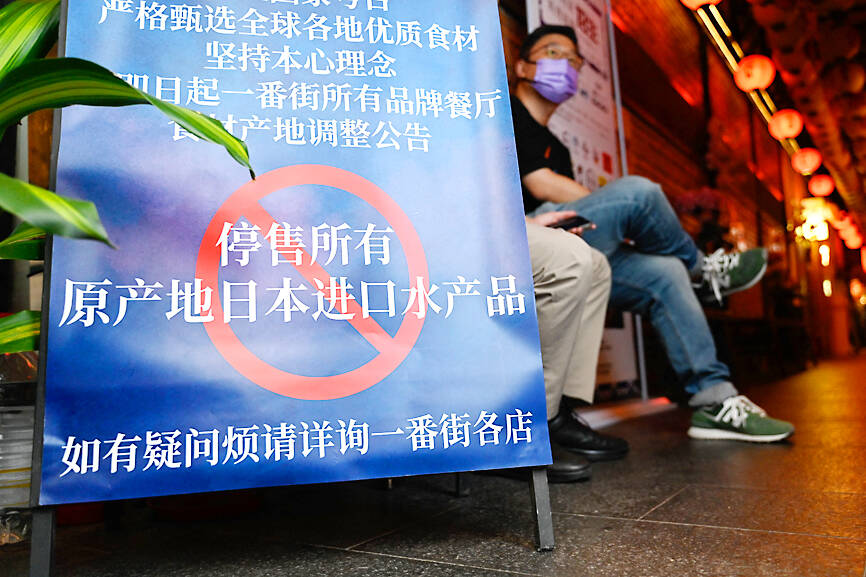Shares of Japanese companies that are especially reliant on China demand plunged after users online in Asia’s biggest economy called for a boycott over the release of treated wastewater from the wrecked Fukushima Dai-ichi nuclear power plant.
Tokyo-based cosmetics firm Shiseido Co fell 2.6 percent to a nine-month low, on a day when the broader TOPIX gained 1.5 percent.
Its revenue from China accounts for 30 percent of the total, data compiled by Bloomberg showed.

Photo: AFP
Shiseido’s local competitors, including Pola Orbis Holdings Inc and Kose Corp, also declined, while department store Takashimaya Co dropped more than 3 percent, and Don Quijote operator Pan Pacific Holdings Corp fell more than 4 percent.
China last week said that it would suspend seafood imports from Japan, and Chinese chat pages have been flooded with posts about boycotting Japanese products.
“The Chinese government’s reaction to the treated water has been surprisingly severe,” Mito Securities Co chief fund manager Hajime Sakai said. “Local media reports of cancellations of Japan tours and boycotts have raised concerns that the impact on inbound business may spread unexpectedly as China prepares for the travel demand season.”
Signs that consumers are steering clear of Japanese products are especially disappointing for companies that had expected their sales to be bolstered by China’s resumption of group tours to its neighboring nation earlier this month.
However, the share sell-off may be short-lived considering that China’s boycotts have not lasted long in the past, Asymmetric Advisors Pte strategist Amir Anvarzadeh said.
For now, the boycott is a hot topic online in China. One post on Sina Weibo lists dozens of Japanese brands to avoid buying, including Shiseido, Panasonic, Uniqlo, Mitsubishi, Aeon and Nomura.
The post has received more than 10,000 “likes” since it was published on Thursday last week.
Yet despite the online protests, some analysts say that demand for Japanese products can be expected return after a while.
“Japan’s products are highly sought after by the Chinese tourists, and the weak yen is only going to make them more attractive,” Saxo Capital Markets market strategist Charu Chanana said.

When an apartment comes up for rent in Germany’s big cities, hundreds of prospective tenants often queue down the street to view it, but the acute shortage of affordable housing is getting scant attention ahead of today’s snap general election. “Housing is one of the main problems for people, but nobody talks about it, nobody takes it seriously,” said Andreas Ibel, president of Build Europe, an association representing housing developers. Migration and the sluggish economy top the list of voters’ concerns, but analysts say housing policy fails to break through as returns on investment take time to register, making the

‘SILVER LINING’: Although the news caused TSMC to fall on the local market, an analyst said that as tariffs are not set to go into effect until April, there is still time for negotiations US President Donald Trump on Tuesday said that he would likely impose tariffs on semiconductor, automobile and pharmaceutical imports of about 25 percent, with an announcement coming as soon as April 2 in a move that would represent a dramatic widening of the US leader’s trade war. “I probably will tell you that on April 2, but it’ll be in the neighborhood of 25 percent,” Trump told reporters at his Mar-a-Lago club when asked about his plan for auto tariffs. Asked about similar levies on pharmaceutical drugs and semiconductors, the president said that “it’ll be 25 percent and higher, and it’ll

CHIP BOOM: Revenue for the semiconductor industry is set to reach US$1 trillion by 2032, opening up opportunities for the chip pacakging and testing company, it said ASE Technology Holding Co (日月光投控), the world’s largest provider of outsourced semiconductor assembly and test (OSAT) services, yesterday launched a new advanced manufacturing facility in Penang, Malaysia, aiming to meet growing demand for emerging technologies such as generative artificial intelligence (AI) applications. The US$300 million facility is a critical step in expanding ASE’s global footprint, offering an alternative for customers from the US, Europe, Japan, South Korea and China to assemble and test chips outside of Taiwan amid efforts to diversify supply chains. The plant, the company’s fifth in Malaysia, is part of a strategic expansion plan that would more than triple

Taiwanese artificial intelligence (AI) server makers are expected to make major investments in Texas in May after US President Donald Trump’s first 100 days in office and amid his rising tariff threats, Taiwan Electrical and Electronic Manufacturers’ Association (TEEMA, 台灣電子電機公會) chairman Richard Lee (李詩欽) said yesterday. The association led a delegation of seven AI server manufacturers to Washington, as well as the US states of California, Texas and New Mexico, to discuss land and tax issues, as Taiwanese firms speed up their production plans in the US with many of them seeing Texas as their top option for investment, Lee said. The